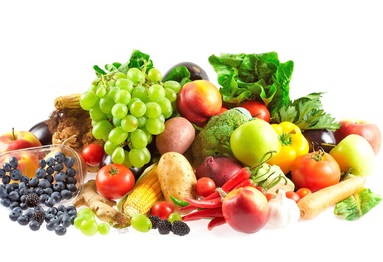While there are many opinions about the best diet for eczema, the truth is that there hasn’t been a great deal of research showing any special eczema diets lead to significant improvement in the condition. Here we’ll help you separate facts from fiction and tell you what you need to know about eating a healthful diet if you have eczema. If you need more information, talk with your doctor or schedule an appointment with a registered dietician.
A Healthful Diet For Eczema
A healthy diet for someone with eczema is quite similar to a healthy diet for someone without the condition. Eat a varied diet including lean protein, low-fat dairy products or other sources of calcium (like dark leafy greens, salmon, perch, sardines, soybeans), whole grains, fresh fruits and vegetables, and healthful fats in moderation. Limit refined sugar and heavily processed foods. Maintain a healthy weight if you can and drink plenty of water.

Food Allergies
Food allergies are not believed by most doctors to be a cause of eczema but some people with eczema do have food allergies. If you’re allergic to any foods, of course, you should avoid them. Common food allergens include peanuts, other nuts, dairy products, wheat products, or other grains containing gluten, soy products, shellfish, eggs, citrus fruits, corn, and tomatoes. If any of these foods seem to worsen your symptoms of eczema, then avoid them, as well; otherwise, there’s no reason not to eat them.
Essential Fatty Acids
Essential fatty acids, found in foods like cold-water fish, nuts, seeds, olive oil, and tofu, help reduce inflammation and also contribute to healthy skin. Including more of these foods in your diet for eczema may lead to an improvement in symptoms of eczema over time. You can also take fish oil or flaxseed oil supplements if you find it difficult to include many of these foods in your diet.
Flavonoids
Flavonoids are antioxidants found in some foods, including apples, blueberries, raspberries, strawberries, black beans, pinto beans, onions, tomatoes, cabbage, apricots, and pears. According to the University of Maryland Medical Center, they help reduce inflammation throughout the body and may reduce symptoms of eczema.
Probiotics
Some studies suggest that probiotics can help relieve symptoms of eczema. Probiotics are live bacteria cultures found in many yogurts. You can also take them in supplement form.
Breastfeeding
Eczema commonly begins in early childhood or even infancy. While we often don’t think about special eczema diets for infants, studies show infants that are breastfed exclusively for at least four months are less like to develop eczema than those that are not breastfed exclusively, especially if their mothers avoid cow’s milk while breastfeeding. Of course, there are numerous other benefits to breastfeeding, as well, including boosting your baby’s immune system and decreasing the risk of food allergies.
Vitamins And Minerals That Nourish The Skin
Your body needs a number of vitamins and minerals to nourish your skin and keep it healthy, including vitamin A, vitamin E, and zinc. Foods containing vitamin A include things like sweet potatoes, carrots, dark leafy greens, apricots, and cantaloupe. In addition to helping your skin stay healthy, vitamin A boosts the immune system, which is also helpful for people with eczema. Foods containing vitamin E include dark leafy greens, fatty fish, nuts, and seeds. Foods high in zinc include seafood, beef, lamb, beans, and mushrooms.
In addition to including foods with vitamins and minerals that nourish your skin in your diet for eczema, you can use a moisturizing cream that contains nutrients to boost your skin’s health, as well. We like Wild Naturals Eczema and Psoriasis Moisturizing Skin Cream, which contains a number of vitamins and minerals along with other natural ingredients that all work together to eliminate dry, itching skin and keep the skin as healthy as it can be. To learn more about Wild Naturals Eczema and Psoriasis Moisturizing Skin Cream, just follow the link.
